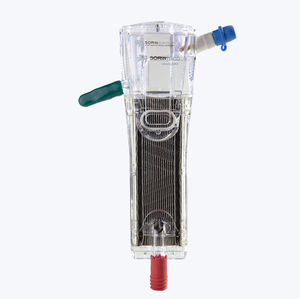
Intraoperative autotransfusion system Xtra™

Add to favorites
Compare this product
fo_shop_gate_exact_title
Characteristics
- Application
- intraoperative
Description
It brings together three decades of experience and improvements in cell salvage procedures, treating more than 0.5 million patients per year.
Ready to meet any surgical scenario: from scheduled treatments to emergency situations and everything in between
Performance where you need it
Consistently high RBC hematocrit and wash quality with standard protocol
Excellent heparin and protein removal
High RBC recovery rate
Quiet and powerful vacuum pump
Specific protocol for fat removal
Clinical Applications
Despite being a widely used procedure, there are known risks associated with blood transfusion. Adverse events are still found in clinical practice related either directly or indirectly to homologous blood transfusion.
Autotransfusion plays a key role as part of an effective blood management strategy. It can contribute to improved clinical outcomes in a cost-effective manner, either as stand-alone or as part of a Patient Blood Management program.
In Cardiac Surgery
Patients undergoing cardiac surgeries are commonly at an advanced stage and comorbidities such as myocardial infarction, making effective blood products management an essential component of their care.
Autotransfusion lowers the transfusion rates during and after Cardiac Surgery.
Outside of Cardiac Surgery
The rate of allogeneic red blood cell transfusions in non-cardiac surgery settings has been found to be between 21% and 70%, with the majority of authors reporting figures in the middle of the range. Allogeneic blood transfusion raises multiple challenges:
Risk of pathogen transmission
Health/economic costs
Scarcity of resources
VIDEO
Related Searches
*Prices are pre-tax. They exclude delivery charges and customs duties and do not include additional charges for installation or activation options. Prices are indicative only and may vary by country, with changes to the cost of raw materials and exchange rates.









